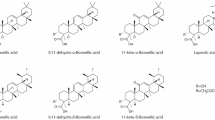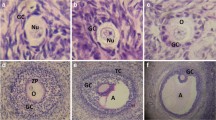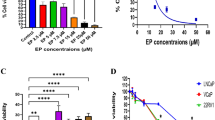Abstract
We read with great interest the study by Seo et al1 entitled “Trichostatin A induces NAG-1 expression and apoptosis in human endometriotic stromal cells” published in your journal.
The authors investigated the use of trichostatin A (TPA), a histone deacetylase inhibitor (HDACI), for inducing growth arrest and apoptosis of human endometriotic stromal cells (HESCs) obtained from 15 women with ovarian endometriomas who underwent previous cystectomy. In particular, TPA was effective in enhancing the expression of nonsteroidal anti-inflammatory drug-activated gene 1 (NAG-1), a critical proa-poptotic gene, which has been demonstrated in patients with endometriosis.2
The rational of this study is based on the evidence that epigenetic aberrations may underlie the pathogenesis of endo-metriosis and that the use of HDACIs can modulate the histone acetylation/deacetylation and, thus, protein transcription.3 These drugs have demonstrated to inhibit proliferation and to stimulate apoptosis of various cell types, including HESCs.4–7 Furthermore, their administration has been supported by previous studies on animal model with endometriosis, resulting efficacious in decreasing size and number of implants and in reducing disease-related hyperalgesia.8,9
Similar content being viewed by others
References
Seo SK, Lee JH, Chon SJ, et al. Trichostatin A induces NAG-1 expression and apoptosis in human endometriotic stromal cells. Reprod Sci. 2017:1933719117741372.
Seo SK, Nam A, Jeon YE, Cho S, Choi YS, Lee BS. Expression and possible role of non-steroidal anti-inflammatory drugactivated gene-1 (NAG-1) in the human endometrium and endometriosis. Hum Reprod. 2010;25(12):3043–3049.
Kawano Y, Nasu K, Li H, et al. Application of the histone deacetylase inhibitors for the treatment of endometriosis: histone modifications as pathogenesis and novel therapeutic target. Hum Reprod. 2011;26(9):2486–2498.
Wu Y, Starzinski-Powitz A, Guo SW. Trichostatin A, a histone deacetylase inhibitor, attenuates invasiveness and reactivates E-cadherin expression in immortalized endometriotic cells. Reprod Sci. 2007;14(4):374–382.
Wu Y, Guo SW. Suppression of IL-1ß-induced COX-2 expression by trichostatin A (TSA) in human endometrial stromal cells. Eur J Obstet Gynecol Reprod Biol. 2007;135(1):88–93.
Wu Y, Guo SW. Histone deacetylase inhibitors trichostatin A and valproic acid induce cell cycle arrest and p21 expression in immortalized human endometrial stromal cells. Eur J Obstet Gynecol Reprod Biol. 2008;137(2):198–203.
Chen Y, Cai S, Wang J, Xu M. Valproic acid-induced histone acetylation suppresses CYP19 gene expression and inhibits the growth and survival of endometrial stromal cells. Int J Mol Med. 2015;36(3):725–732.
Lu Y, Nie J, Liu X, Zheng Y, Guo SW. Trichostatin A, a histone deacetylase inhibitor, reduces lesion growth and hyperalgesia in experimentally induced endometriosis in mice. Hum Reprod. 2010;25(4):1014–1025.
Liu M, Liu X, Zhang Y, Guo SW. Valproic acid and progestin inhibit lesion growth and reduce hyperalgesia in experimentally induced endometriosis in rats. Reprod Sci. 2012;19(4):360–373.
Xishi L, Lei Y, Guo SW. Valproic acid as a therapy for adenomyosis: a comparative case series. Reprod Sci. 2010;17(10):904–912.
Tafi E, Leone Roberti Maggiore U, Alessandri F, et al. Advances in pharmacotherapy for treating endometriosis. Expert Opin Pharmacother. 2015;16(16):2465–2483.
Author information
Authors and Affiliations
Corresponding author
Rights and permissions
About this article
Cite this article
Barra, F., Ferrero, S. Epigenetic Drugs in the Treatment of Endometriosis. Reprod. Sci. 26, 1327–1328 (2019). https://doi.org/10.1177/1933719118765987
Published:
Issue Date:
DOI: https://doi.org/10.1177/1933719118765987




